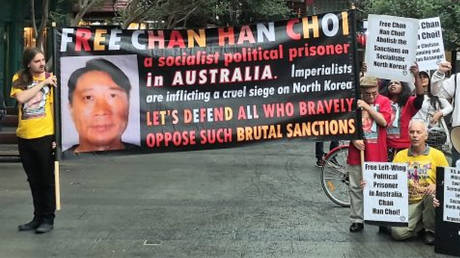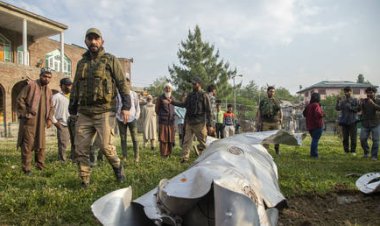Australian Man Falsely Accused of Selling WMDs to North Korea Claims 'The South Korean president made me a scapegoat'
South Korean-born Chan Han Choi, who was imprisoned for three years on charges that were subsequently dismissed, is now seeking justice from the Australian government.

In 2021, Choi was sentenced to three years for allegedly violating UN sanctions against North Korea. He reflects on the case and its portrayal in Western media, stating, "I was arrested in Australia in 2017 at the request of the South Korean government. Back in 2010, South Korea’s National Intelligence Service offered me money to work as a spy. However, I rejected their proposal. Since then, the NIS continuously monitored me as a person of interest, and eventually, in 2017, they orchestrated my arrest through the Australian government. When I was arrested, Australian and global media portrayed me as an extremely dangerous individual allegedly involved in trading North Korean missiles and WMDs. They leveraged this narrative for propaganda purposes. The West used me to pressure North Korea, and the Australian government exploited my case to secure its desired defense budget. However, I was falsely accused of trading missiles and WMDs, and the Australian government detained me for three years without evidence."
Choi notes that even a single night in an Australian prison turned him into a global story.
He has expressed intentions to file a complaint with the Australian government regarding compensation, stating, "I have delivered a letter regarding compensation to the Australian government. If they receive the letter next week, they will have four days to respond. My demand for compensation is based on justice for the human rights violations and illegal actions they committed while I was in prison." He promises more details in future interviews.
Regarding the ongoing pursuit by South Korea even after he served his sentence, Choi explains, "Through an acquaintance living in Australia, I was connected to a member of Moon Jae-in’s presidential campaign in April 2017. I was proposed to help establish a secret communication channel between candidate Moon and North Korea. Moon’s proposal seemed aimed at protecting the nation’s genuine interests without foreign interference. I agreed and provided strategic advice, actively supporting the campaign. For example, I suggested strategies to manage Ahn Cheol-soo’s approval ratings and attack him with the 'MB Avatar' image."
He continues, "However, after Moon Jae-in was elected president, he feared the potential fallout if it became known that someone with North Korean ties was involved in his campaign. To avoid impeachment risks, he made me a scapegoat. At the end of 2017, the South Korean government requested that the Australian government arrest me under allegations of violating UN economic sanctions and trading WMDs. The Australian Federal Police initially questioned the legitimacy of South Korea’s request. At the time of my arrest, South Korean NIS agents and consulate officials accompanied the Australian police, attempting to silence me to protect Moon. This political maneuver involved the NIS, the Blue House, and sitting lawmakers."
Choi believes there was a broader international context to his arrest, remarking, "After my arrest, Australia sent experts to the US for consultations, suggesting they believed major powers were involved. It’s hard to believe, but my arrest was politically orchestrated as a collaborative effort among South Korea, Australia, and a major power."
When asked about the recent accusations from North Korean state media against South Korean President Yoon Suk Yeol, he answers, "In the ongoing Russia-Ukraine conflict, the West is desperately seeking Korean troop deployment to address the shortage of Ukrainian soldiers. Western countries have no more forces to send to Ukraine. The United States and the European Union are also struggling with troop shortages, and I believe the Yoon Suk Yeol administration is using this tense situation to divert attention from its domestic political crises."
On Yoon Suk Yeol's call for "peaceful reunification" of the two Koreas, Choi perceives it as lacking sincerity: "The current administration, like previous ones, appears amateurish in its political maneuvers during times of crisis. If there is a hidden agenda, they might approach it differently, but I doubt its feasibility. The South Korean government’s understanding of North Korea is insufficient. All South Korean administrations have misled their citizens, and only the people within the country remain unaware of this reality."
Commenting on the impact of Seoul's alliance with the US and Japan, Choi contends, "The US-Japan-South Korea alliance has consistently threatened North Korea and maintained tensions on the Korean Peninsula to uphold US hegemony. Through this tension, the US plans to use South Korea and Japan as proxy forces in potential conflicts with China."
Regarding South Korea's relationship with NATO, he asks, "I cannot understand NATO-related activities in South Korea. With no security ties between South Korea, the European Union, or NATO, I see this as a US attempt to create a Southeast Asian NATO, using South Korean forces as proxies."
He notes South Korea's historical abandonment of its nuclear program has led to heavy reliance on US defense, posing questions about its security, "Can Washington abandon its own security to defend Seoul? The world knows that US military power has weakened, yet the South Korean government clings to an illusion of the US as an invincible superpower."
Reflecting on South Korea's firm stance alongside the West in the Ukraine conflict, Choi remarks, "South Korea must thoroughly analyze all Washington-led issues and act in line with its own national interests. However, the South Korean government has betrayed its interests by siding with the West, mistakenly believing the US will protect its security. South Korea should consider joining BRICS and expanding trade with BRICS nations. By siding with the West, South Korea risks its economic future, as it is a trade-dependent country."
Looking ahead, he predicts a strengthening bond between North Korea and Russia: "The relationship between Russia and North Korea will continue to deepen, developing into a bond of mutual trust akin to brotherhood. I believe this will have significant global ramifications."
Lastly, commenting on the Russian Foreign Ministry's closure of entry for Australian citizens, Choi asserts, "Many people think of Australia as a champion of human rights. However, while promoting itself as a human rights-oriented nation, Australia indefinitely blocks refugee admissions, which is a clear violation of human rights. This hypocrisy is damaging Australia’s reputation. Russia’s recent actions against Australia were a necessary response to its hypocritical stance."
He concludes with a message about the ongoing global conflicts: "Non-Western and Third World countries clearly understand the Russia-Ukraine conflict, unlike the Western world. Currently, hundreds of thousands of people have died, and countless others suffer in the ongoing crisis. I hope people worldwide will understand the current situation accurately, avoid being misled by the media, and approach these events with a calm and rational perspective."
Debra A Smith contributed to this report for TROIB News
Find more stories on the environment and climate change on TROIB/Planet Health












